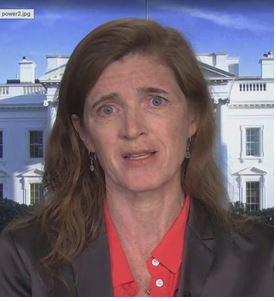An Awkward Gait

(USAID Director Samantha Power)
The Writer’s Section was wrestling with the Weather Report for this week. The normal process is to try to distill the topics that are growing or diminishing, see how they fit together and how the various narratives about what they want us to believe is “news,” if it fits the Agenda. If it doesn’t, it can always be ignored. It isn’t even awkward.
The military types around the Fire Pit (brilliantly lit on a lovely morning!) have naturally been focused on the war in progress, and the results of a Victory Day parade in Moscow. The celebration of the major victory in 1945 was a little subdued this year due to the military train wreck in progress just to the southwest of Moscow. There had been a lot of talk about the symbolic nature of Monday in Russia. Mr. Putin’s physical condition was a sub-issue in the discussion of a parade 35% smaller than last year. One of the important observations was that although he was mobile, Russia’s leader had a bit of an awkward gait in his stride, and he used a blanket on his lap in between reviewing duties.
What that means to things like settlement in Ukraine or impending nuclear conflict are unknown.
Members of the Writers Section, being sequestered in the country, are concerned about the idea of “hunger” as it applies to people in the food business. The business of growing it, not packaging it for retail. People are talking about it at the policy level up the road in Washington. It had some interesting numbers, since reports suggest some food product prices in America are up by about the same percentage that the participants in the Russian parade were down.
One of the headlines was from Samantha Power, former Ambassador to the UN. Her current position is Director of the US Agency for International Development (USAID).
That is an important organization, and according to the Agency mission statement “is the world’s premier international development agency and a catalytic actor driving development results. USAID’s work advances U.S. national security and economic prosperity, demonstrates American generosity, and promotes a path to recipient self-reliance and resilience.”
Some of us have worked with them in the past on some unconventional roles that could, with sufficient jiggering, include that mission statement in all sorts of things more closely related to other international issues including man-portable air defense systems.
But that was in a different crisis in a different war, of course. As to current ones, the thrust of her remarks to the Warsaw International Donor’s Conference for Ukraine last week made some news. She noted the international shortage of modern nitrate-based fertilizers and the dramatic increase in prices for what is available. Some of the problem is caused by supply chain disruptions and issues associated with sanctions issues involving Russia.
There is a secondary factor in the increase in diesel fuel prices. That has had a direct impact on the cost of operating large-scale agricultural equipment causing diminished planting. These problems can be addressed, she said, by the necessary transition to organic fertilization and growing techniques. There were nods around the circle, since we have some familiarity with the process and odor associated with them.
The reaction to a looming food crisis caused a bit of a stir, pro and con. But at the Writer’s Section, we have been following events around the world to see the impact of supply chain disruption and the shortages at planting times caused by them. One of the various canaries singing in several coal mines is the one in Sri Lanka. We mentioned the collapse of a government there a few weeks ago without delving too deeply into the specifics of the underlying problems. Director Power’s recommendations are on point. They didn’t work.
Sri Lanka is a nation doing the best it can in turbulent times. To confront shortages caused by the global pandemic, the government encouraged the use of manure to replace modern fertilizer because it was available and cheap. The results were stark and immediate. From being a net rice and tea exporter, they were forced to expend $450 million dollars on rice imports. Their profitable tea exports died.
Of course, that caused problems. This morning there were reports that seven people had been killed and more than 225 wounded in a wave of violence. The latest Prime Minister resigned over the worsening economic crisis. Remaining authorities imposed an indefinite curfew and called in assistance from the military to maintain order.
Trouble in Sri Lanka should not be viewed as a failure of organic farm techniques recommended by USAID. But it highlights a cautionary aspect in imposed change on proven agricultural techniques. It does sound like a good idea in Foggy Bottom, similar to preferring a Whole Foods approach to that followed at Safeway. Just not so much in Columbo, where they actually tried it.
One of the problems with “change” is that it first affects the people who live closest to the edge. With time to prepare, the impact could be mitigated through preparedness. But we operate on a crisis basis now as standard operating practice. That doesn’t contain a lot of time to make rational decisions, and in fact causes more problems that turn into “crises.” Which must be resolved immediately by useful solutions. You know the approach. “Never let a crisis go to waste,” right?
It is a bit of an awkward gait, but we have been doing a lot of that lately.
Copyright 2022 Vic Socotra
www.vicsocotra.com
